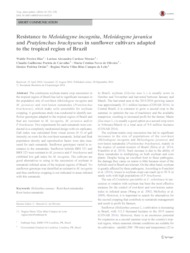Resistance to Meloidogyne incognita, Meloidogyne javanica and Pratylenchus brachyurus in sunflower cultivars adapted to the tropical region of Brazil.
Resistance to Meloidogyne incognita, Meloidogyne javanica and Pratylenchus brachyurus in sunflower cultivars adapted to the tropical region of Brazil.
Author(s): DIAS, W. P.; MORAES, L. A. C.; CARVALHO, C. G. P.; OLIVEIRA, M. C. N. de; LEITE, R. M. V. B. de C.; ORSINI, I. P.
Summary: The continuous soybean-maize crop succession in the tropical region of Brazil has led to significant increases in the population size of root-knot (Meloidogyne incognita and M. javanica ) and root-lesion nematodes (Pratylenchus brachyurus), which make soils unsuitable for soybean cropping. A greenhouse study was conducted to identify sunflower genotypes adapted to the tropical region of Brazil and that are resistant to M. incognita, M. javanica and/or P. brachyurus . Two experiments for each nematode were conducted in a completely randomized design with six replicates. Gall index was calculated from visual scores (0?5) of gall intensity on roots for the root-knot nematode. Initial and final population density and reproduction factor were also measured for each nematode. Sunflower genotypes varied in resistance to the nematodes. Sunflower hybrids BRS 321 and BRS 323 were resistant to M. javanica and P. brachyurus and exhibited low gall index for M. incognita . The cultivars are good alternatives to using in the succession of soybean in nematode-infested areas of the tropical regions of Brazil. No sunflower genotype was identified as resistant to M. incognita and thus sunflower cropping is not indicated in areas infested with this nematode.
Publication year: 2016
Types of publication: Journal article
Unit: Embrapa Soybean
Observation
Some of Embrapa's publications are published as ePub files. To read them, use or download one of the following free software options to your computer or mobile device. Android: Google Play Books; IOS: iBooks; Windows and Linux: Calibre.
Access other publications
Access the Agricultural Research Database (BDPA) to consult Embrapa's full library collection and records.
Visit Embrapa Bookstore to purchase books and other publications sold by Embrapa.

